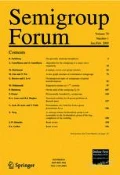Abstract
Just as complete lattices can be viewed as the completions of posets, quantales can also be treated as the completions of partially ordered semigroups. Motivated by the study on the well-known Frink completions of posets, it is natural to consider the “Frink” completions for the case of partially ordered semigroups. For this purpose, we firstly introduce the notion of precoherent quantale completions of partially ordered semigroups, and construct the concrete forms of three types of precoherent quantale completions of a partially ordered semigroup. Moreover, we obtain a sufficient and necessary condition of the Frink completion on a partially ordered semigroup being a precoherent quantale completion. Finally, we investigate the injectivity in the category \(\mathbf {APoSgr}_{\le }\) of algebraic partially ordered semigroups and their submultiplicative directed-supremum-preserving maps, and show that the \(\mathscr {E}_{\le }\)-injective objects of algebraic partially ordered semigroups are precisely the precoherent quantales, here \(\mathscr {E}_{\le }\) denote the class of morphisms \(h:A\longrightarrow B\) that preserve the compact elements and satisfy that \(h(a_1)\cdots h(a_n)\le h(b)\) always implies \(a_1\cdots a_n\le b\).





Similar content being viewed by others
References
Abramsky, S., Vickers, S.: Quantles, observational logic and process semantics. Math. Struct. Comput. Sci. 3, 161–227 (1993)
Adámek, J., Herrlich, H., Strecker, G.E.: Abstract and Concrete Categories. The Joy of Cats. Wiley, New York (1990)
Eklund, P., García, J.G., Höhle, U., Kortelainen, J.: Semigroups in Complete Lattices: Quantales, Modules and Related Topics. Developments in Mathematics, vol. 54. Springer, Berlin (2018)
Frink, O.: Ideals in partially ordered sets. Am. Math. Mon. 61, 223–234 (1954)
Hofmann, D., Waszkiewicz, P.: Approximation in quantale-enriched categories. Topol. Appl. 158, 963–977 (2011)
Han, S.W., Zhao, B.: \(Q\)-fuzzy subsets on ordered semigroups. Fuzzy Sets Syst. 210, 102–116 (2013)
Han, S.W., Zhao, B.: The quantale completion of ordered semigroup. Acta Math. Sin. Chin. Ser. 51, 1081–1088 (2008)
Johnstone, P.T.: Stone Spaces. Cambridge University Press, Cambridge (1982)
Keimel, K.: A unified theory of minimal prime ideals. Acta Math. Acad. Sci. Hung. 23, 51–69 (1972)
Lambek, J., Barr, M., Kennison, J.F., Raphael, R.: Injective hulls of partially ordered monoids. Theory Appl. Categ. 26, 338–348 (2012)
Larchey-Wendling, D., Galmiche, D.: Quantales as completions of ordered monoids: revised semantics for intuitionistic linear logic. Electron. Notes Theor. Comput. Sci. 35, 94–108 (2000)
Paseka, J.: Regular and normal quantales. Arch. Math. 22, 203–210 (1986)
Rosenthal, K.I.: Quantales and Their Applications. Longman Scientific and Technical, Harlow (1990)
Resende, P.: Étale groupoids and their quantales. Adv. Math. 208, 147–209 (2007)
Stubbe, I.: Categorical structures enriched in a quantaloid: categories, distributors and functors. Theory Appl. Categ. 14, 1–45 (2005)
Solovyov, S.A.: From quantale algebroids to topological spaces: fixed-and variable-basis approaches. Fuzzy Sets Syst. 161, 1270–1287 (2010)
Sankappanavar, H.P., Burris, S.: A Course in Universal Algebra. Graduate Texts in Mathematics. Springer, Berlin (1981)
Xia, C.C., Han, S.W., Zhao, B.: A note on injective hulls of posemigroups. Theory Appl. Categ. 32, 254–257 (2017)
Xia, C.C., Zhao, B., Han, S.W.: Further results of quantale completions of the partially ordered semigroup. Acta Math. Sin. Chin. Ser. 61, 811–822 (2018)
Yetter, D.N.: Quantales and (noncommutative) linear logic. J. Symb. Log. 55, 41–64 (1990)
Zhang, D.X.: An enriched category approach to many valued topology. Fuzzy Sets Syst. 158, 349–366 (2007)
Zhang, X., Laan, V.: Injective hulls for posemigroups. Proc. Estonian Acad. Sci 63, 372–378 (2014)
Author information
Authors and Affiliations
Corresponding author
Additional information
Communicated by Jimmie D. Lawson.
Publisher's Note
Springer Nature remains neutral with regard to jurisdictional claims in published maps and institutional affiliations.
This work is supported by the National Natural Science Foundation of China (11531009)
Rights and permissions
About this article
Cite this article
Zhao, B., Xia, C. Precoherent quantale completions of partially ordered semigroups. Semigroup Forum 100, 617–633 (2020). https://doi.org/10.1007/s00233-019-09997-w
Received:
Accepted:
Published:
Issue Date:
DOI: https://doi.org/10.1007/s00233-019-09997-w


